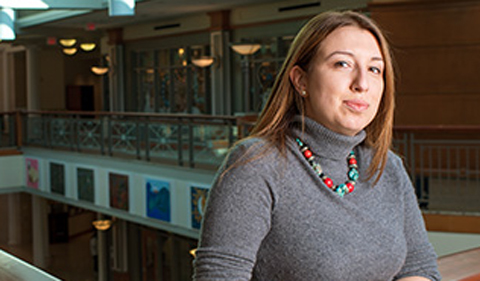The annual Baker Peace Conference is Feb. 20-21 at Ohio University. This year’s focus is on “Religion and Peace: Global Perspectives and Possibilities.”
This year’s conference, sponsored by the Contemporary History Institute, has been co-organized by Dr. Nukhet Sandal, Associate Professor and Chair of Political Science at Ohio University. CHI caught up with Sandal to talk about this year’s conference.
What inspired the theme on Religion and Peace for this year’s conference?
I work on how religious leaders have positively influenced peace agreements in different parts of the world. I have a book called Religious Leaders and Conflict Transformation: Northern Ireland and Beyond (Cambridge University Press, 2017), and I continue to study dynamics of religion and politics. I made the suggestion to the Baker Peace Committee, which I am part of, a couple of years ago, and other members were very much interested in delving more into this topic. At a time when identity politics is in full display with all its manifestations, it is a much-needed intellectual exercise to remember how and under which conditions religion has contributed to stable world and regional orders.
Can you tell us any specific subjects that will be covered by the conference?
We have presenters looking at subjects ranging from humanitarianism to foreign policy, from environmental activism to civil wars. The area coverage is also very impressive – we will have Africa, Latin America, South Asia and the Middle East in addition to the United States and Europe, with most presenters having done extensive field research in these areas. I cannot wait to present my own work on Islam, Kurdish identity and peace movements in Turkey and to learn from other presenters who have done stellar research on other geographic areas and relationships. Ingo Trauschweizer and I expect this to be a rich conversation with direct policy implications, so we plan to edit a book with the works and insights presented in the conference. There has never been a better time for these discussions, frankly.
How do you think this conference will offer a unique perspective on the subject of religion and violence?
Especially after 9/11, there has been a drastic increase in works that looks at religion and violence. For a long time, there were not many articles or books that look at religion and peace dynamics. Although our focus is on religion and peace for this conference, one cannot talk about peace without violence and conflict. The insights scholars will share will contribute not only to our understanding of peace, but also violence. “When and how did religious actors contribute to peace and stability?” has also the question of “when did they not” in it. So, all the lessons we derive from our conversations and discussions will help us answer the questions of when and why religious actors might not always be the constructive actors in a given context.





















Comments